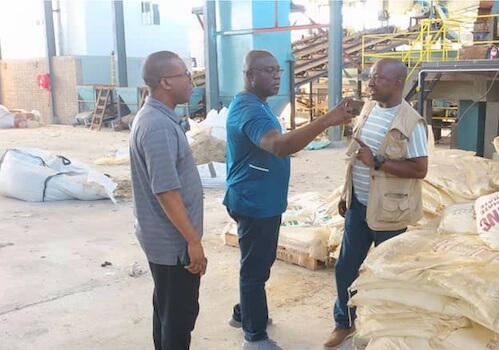Managing Director of Republic Bank Ghana, Benjamin Dzoboku, has paid a visit to GrowMax Fertilizer factory located outside of Namibia’s capital city of Windhoek.
GrowMax Fertilizer factory is one of the single major investment initiatives by the Abanga Group of Companies, a premium agribusiness company founded by Ghanaian agriprenur Thomas Abanga.
The visit by Mr. Dzoboku, who was accompanied by his Deputy Head of Corporate Banking Nana Owusu-Manu, was to assess the prospects of the factory and see how the Bank could provide financial support towards its expansion.
According to Mr. Abanga, the visit was also part of the cultivation of a growing business relationship between the Republic Bank Ghana and Abanga Farms & Food Systems (AFFS), a subsidiary of the Abanga Group.
“Mr. Dzoboku and Nana arrived in Namibia on February 9 to hold a series of meetings with top Namibian Government officials including the Prime Minister, Minister of Agriculture and Land Reform, Governor of the Bank of Namibia, MD of Bank of Windhoek, CEO and Executives of Meat Corporation of Namibia and the CEO of Namibia Investment Promotion and Development Board.
Republic Bank Ghana currently is financing AFFS export of meat products to the Ghanaian market since we signed an exclusive distributorship agreement with Meat Corporation of Namibia in 2020. So the meetings and discussions would revolve around AFFS investments in Namibia’s agricultural sector and plans to export and distribute more Namibia meat products in the West African market including Ghana”, he explained.
Mr. Dzoboku was quite impressed with the level of significant investment initiatives being made by subsidiaries of the Abanga Group in the Namibian agricultural sector.
The establishment of GrowMax Fertilizer factory by AFFS and A&G Agro-Mechanical Industries Ltd is expected to increase the production of fertilizer and make the inputs more affordable for smallholder farmers in Namibia.
Agro machinery assembly facility for farm tractors and implements.
AFFS & A&G Agro-Mechanical Industries are also establishing an agro machinery assembly facility for farm tractors and implements spare parts which would lead to setting up of six mechanization centres at six different locations in Namibia towards the successful implementation of a crop production, mechanization, seed system and irrigation development with much focus on maize, sorghum and pearl millet cultivation.
The locations are Kavango East with allocation of 22 tractors, 100 workers and 12,000 farmers; Kavango West 23 tractors, 100 workers and 12,000 farmers; Ohangwena 23 tractors, 100 workers and 12,000 farmers; Oshana 23 tractors, 100 workers and 12,000 farmers; Oshikoto 16 tractors, 80 workers and 10,000 farmers; and Otjozondjupa 25 tractors, 100 workers and 15,000 farmers.
Each farmer is expected to cultivate 2 hectares of land leading to the production 5 metric tons of crops by the end of each cropping season. This translates to 600 farm mechanization workers, 73,000 farmers, 144,000 hectares of cultivated land and 355,000 metric tons of crop yields.
The mechanization centres would hold assembled tractors, supply tractor services to farmers, serves as local repair and maintenance centres, and provide agro training services to farmers in Namibia and subsequently to other parts of Southern Africa.
The partnership would also establish shops for housing tractor spare parts and implements for sale, service centre where broken down tractors would be routinely maintained, warehouse silos with holding capacity of 10,000 metric tons of agro inputs and a grain processing mill that can mill 500 metric tons of grains per day.
Innovative Agriculture.
There is also the sharing of technology by AFFS and A&G Agro-Mechanical Industries with farmers especially improved seeds, chemicals and precision equipment like drones for the application of fertilizer. Additionally, farmers are provided with access to markets by selling their produce directly to the two companies in a special arrangement and agreement.
The Government of Namibia on the other hand is expected to grant some concessions by way of 100% import duty exemptions involving importation of machinery equipment for 5 years; 100% duty exemption on the importation of capital spare parts for 5 years; 100% duty exemption on the importation of fuel and lubricant for 5 years; and 100% duty exemption on the dutiable value of inputs and auxiliary materials for 5 years.
The government is also providing 10,000 hectares of farmland suitable for rice, maize, and soya bean production; additional 20 hectares to set up machinery service provision centre; tax holidays of 5 years; and preferential tariff for electricity when available.
An estimated 5,000 jobs for people including the youth and women in areas such as tractor operations, farm machinery mechanics and farm workers among others would be created. This would contribute to the eradication of unemployment as well as reduce poverty and inequalities amongst young people and women.
By The Abanga Group/PR Unit


